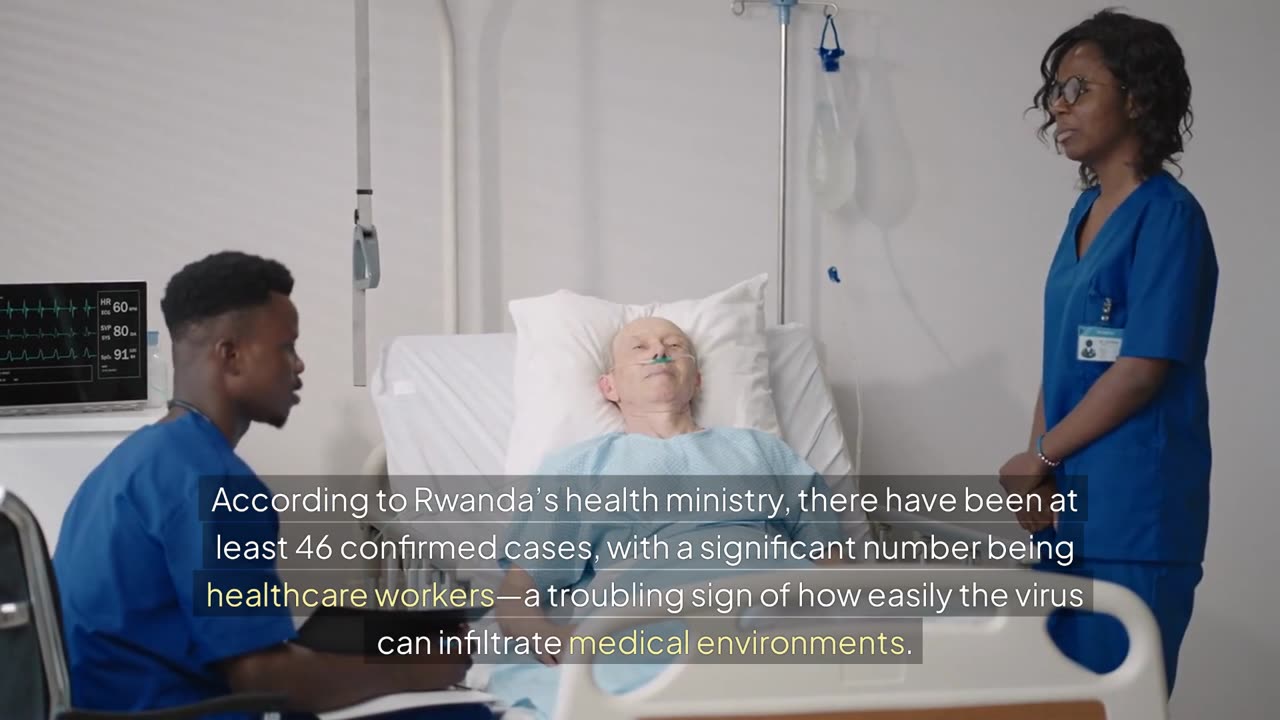Premium Only Content

Rwanda Begins Marburg Vaccine Trials Amid Fatal Outbreak: What You Need to Know
*
The deadly Marburg virus has cast a shadow over Rwanda, claiming the lives of at least 12 people, most of them healthcare workers on the front lines. With the virus spreading and no specific cure, the East African nation has taken a significant step forward by beginning vaccine trials to combat this highly infectious disease. The world is watching as Rwanda administers 700 doses of a potential Marburg vaccine, hoping to halt the spread and protect those most at risk. But what is the Marburg virus, and how dangerous is it? In this article, we’ll explore the outbreak, the vaccine trials, and what lies ahead for Rwanda and the global health community.
**Section 1: The Marburg Virus—A Silent Killer**
Marburg virus disease is a rare but severe hemorrhagic fever, caused by a virus from the same family as Ebola. Its mortality rate is shockingly high, killing between 24% and 88% of those infected, depending on the outbreak and the level of medical care available. The disease was first identified in 1967 after simultaneous outbreaks in Marburg and Frankfurt, Germany, as well as in Belgrade, Serbia.
The virus is transmitted to humans through contact with fruit bats, which are the natural host. Once the virus jumps to humans, it spreads through contact with bodily fluids like blood, urine, saliva, and sweat. Marburg is not airborne, but the ease with which it spreads via close contact makes it a terrifying and highly contagious pathogen. In a healthcare setting, where doctors and nurses are in constant contact with patients, the risk of infection skyrockets, as seen in Rwanda’s current outbreak.
**Section 2: Rwanda’s Response to the Outbreak**
Rwanda, facing its first recorded outbreak of Marburg, has moved swiftly to contain the virus. The health ministry has reported at least 46 confirmed cases, including 12 deaths, most of which occurred among healthcare workers. The source of the outbreak remains unknown, which adds to the challenges of controlling the spread.
In response to the crisis, the Rwandan government has taken decisive steps, including limiting the size of funerals for victims—an important cultural practice but a potential source of further infections. Travel restrictions have also been introduced, along with temperature checks, passenger questionnaires, and hand-sanitizing stations at departure points. These measures aim to prevent the virus from spreading beyond Rwanda’s borders and into neighboring countries, which have also had previous outbreaks.
Health Minister Sabin Nsanzimana has been proactive in reassuring the public. He emphasized that while the virus is dangerous, there is no need for panic, especially as the country begins its first vaccine trials. However, with no proven cure and limited vaccine supplies, Rwanda is racing against time.
**Section 3: The Marburg Vaccine Trials—A Ray of Hope**
In a bid to stop the outbreak in its tracks, Rwanda has received 700 doses of a trial vaccine from the Sabin Vaccine Institute, a U.S.-based non-profit organization. The vaccine is still in its experimental stages but offers a glimmer of hope in a dire situation. The initial recipients of the vaccine will be healthcare workers and those who have been in direct contact with Marburg patients—those at the highest risk of infection.
The Sabin Vaccine Institute had previously conducted trials in Kenya and Uganda, and early results are promising, although the vaccine has only been tested in adults aged 18 and older. As of now, there are no plans to test the vaccine in children, leaving a vulnerable segment of the population without immediate protection. The health minister has also confirmed that the government is working to secure additional vaccine doses to expand the trial.
While the vaccine’s efficacy remains under study, it represents a significant step forward. Vaccines are one of the most powerful tools in preventing the spread of viral outbreaks, as seen in the global fight against Ebola and, more recently, COVID-19.
**Section 4: Why Healthcare Workers Are Most at Risk**
Healthcare workers are often the unsung heroes of viral outbreaks, but they are also among the most vulnerable. In Rwanda, the majority of Marburg virus fatalities have been healthcare professionals working in intensive care units. Their exposure to infected patients puts them at greater risk, particularly when handling bodily fluids or dealing with cases where protective measures might be insufficient.
In past outbreaks, similar trends have been observed. During the 2014 Ebola epidemic, healthcare workers in West Africa were disproportionately affected, highlighting the need for stringent protective protocols and access to vaccines. In Rwanda, the situation is no different. The vaccine trials aim to provide some level of protection to those who need it most—those who are putting their lives on the line to treat patients and contain the outbreak.
**Section 5: What Happens Next—A Global Health Perspective**
The World Health Organization (WHO) is closely monitoring the outbreak in Rwanda. While the risk remains high at the national and regional levels, global concerns have so far been minimal. WHO experts have emphasized that prompt isolation of cases and rapid response are critical to containing the outbreak before it spreads internationally.
That said, this outbreak is a reminder of the interconnectedness of global health. Infectious diseases like Marburg and Ebola know no borders, and in our increasingly globalized world, the rapid spread of viruses can have devastating consequences. Neighboring Tanzania and Uganda have already experienced their own Marburg outbreaks in recent years, and the possibility of the virus crossing borders remains a real threat.
International support and cooperation will be essential in controlling the spread of the Marburg virus and ensuring that Rwanda has the resources it needs, not just for the current vaccine trials but for wider preventive measures. Public health systems in Africa are often underfunded and overstretched, making it imperative that global health organizations remain engaged and ready to provide assistance.
**Conclusion: The Fight Against Marburg Isn’t Over**
The Marburg virus is a deadly adversary, but Rwanda’s swift action in starting vaccine trials is a significant step in the right direction. The 700 doses from the Sabin Vaccine Institute could be the key to preventing a wider catastrophe, particularly among the healthcare workers who are most at risk. However, the road ahead is long, and with the virus continuing to spread, vigilance is crucial.
For now, the world watches Rwanda’s efforts with hope. While there is no vaccine for everyone yet, the ongoing trials could pave the way for more comprehensive solutions in the future. It’s a race against time, but Rwanda’s response offers a model for how quick, decisive action can help combat deadly viral outbreaks.
Remember to stay informed, and don’t forget to like, share, and subscribe to our channel for the latest updates on this developing story. Let us know your thoughts in the comments below—together, we can help spread awareness and fight back against the threats posed by global health crises.
-
 LIVE
LIVE
Kim Iversen
4 hours agoLuigi Mangione Charged With TERRORISM | Liz Cheney Accused Of WITNESS TAMPERING, Faces 20 YEARS IN JAIL
2,899 watching -
 LIVE
LIVE
Akademiks
5 hours agoJay Z says he aint NEVER been friends w/ DIDDY! Bhad Bhabie lost her man? Travis Hunter Down Bad?
4,348 watching -
 2:27:04
2:27:04
AirCondaTv Gaming
3 hours ago $2.69 earnedWar Thunder - Tankering Around for That 10 Bomb
15.5K4 -
 4:19:05
4:19:05
SpartakusLIVE
6 hours agoThe MACHINE locks in for 12-hour POWER stream
12.1K1 -
 1:58:40
1:58:40
Robert Gouveia
5 hours agoJ6 Coverup: Prosecute LIZ CHENEY; NY Judge REJECTS Immunity; Trump Breaks Gag?
50.7K38 -
 2:22:06
2:22:06
WeAreChange
4 hours agoPSYOP Spreads: Drones Shut Down Airport In New York!
39.5K14 -
 1:31:18
1:31:18
Redacted News
6 hours agoEMERGENCY! NATO AND CIA ASSASSINATE TOP RUSSIAN GENERAL, PUTIN VOWS IMMEDIATE RETALIATION | Redacted
183K241 -
 56:45
56:45
VSiNLive
5 hours ago $4.64 earnedFollow the Money with Mitch Moss & Pauly Howard | Hour 1
51.6K2 -
 52:44
52:44
Candace Show Podcast
5 hours agoMy Conversation with Only Fans Model Lilly Phillips | Candace Ep 122
63K244 -
 UPCOMING
UPCOMING
tacetmort3m
6 hours ago🔴 LIVE - RELIC HUNTING CONTINUES - INDIANA JONES AND THE GREAT CIRCLE - PART 5
30.2K